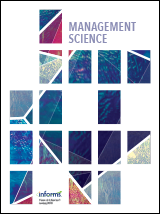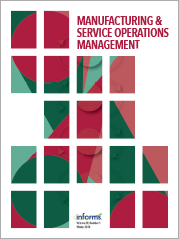Academic articles
Practitioner articles
Working papers
Books
Book chapters
Case studies
Other publications
Subject(s)
Diversity and inclusion; Human resources management/organizational behavior
Keyword(s)
Random selection, diversity bonus, luck, decision biases, paradox of merit, learning traps
Complex tasks often cannot be addressed with expertise, but instead by assembling a diverse cognitive repertoire in teams. In such cases, engaging diversity may enhance performance. Yet various behavioral and social limits often deter organizations from recognizing or integrating valuable diversity. I argue that random selection is an undervalued tool for capturing the diversity bonus because it helps address (1) the paradox of merit, by avoiding fruitless deliberation; (2) biased reasoning, by deciding on the basis of no reason; and (3) learning traps, by discovering self-confirming false beliefs. More generally, incorporating random selection in organizational design can generate a less-is-more effect: deciding by blind luck means exercising less control over outcomes but achieving more by saving time and resources, as well as detecting and sanitizing biased reasons.
Volume
10
Journal Pages
85–91
ISSN (Online)
2245-408X
Subject(s)
Diversity and inclusion; Human resources management/organizational behavior; Strategy and general management
Keyword(s)
Luck, stereotype bias, grit, regression to the mean
Managers are very prone to both benchmarking and stereotyping. These practices lead them into underestimating the power of luck, so that they often attribute success to capabilities and failure to bad luck in people or organizations they see as having the attributes of greatness, while they discount capabilities and attribute success to luck in people or organizations that do not conform to their ideas of greatness. Looking at second-level performers (where luck probably plays a lesser role) may be a smarter way to benchmark.
ISSN (Print)
0017-8012
Subject(s)
Economics, politics and business environment
Keyword(s)
Trade platform, hybrid business model, antitrust policy, tax policy
JEL Code(s)
D42, L12, L13, L40, H25
We provide a canonical and tractable model of a trade platform enabling buyers and sellers to transact. The platform charges a percentage fee on third-party product sales and decides whether to be "hybrid", like Amazon, by selling its own product. It thereby controls the number of differentiated products (variety) it hosts and their prices. Using the mixed market demand system, we capture interactions between monopolistically competitive sellers and a sizeable platform product. Using long-run aggregative games with free entry, we endogenize seller participation through an aggregate variable manipulated by the platform's fee. We show that a higher quality (or lower cost) of the platform's product increases its market share and the seller fee, and lowers consumer surplus. Banning hybrid mode benefits consumers. The hybrid platform might favor its product and debase third-party products if the own product advantage is sufficiently high. We also provide some tax policy implications.
With permission of CEPR. Accepted: RAND Journal of Economics
Subject(s)
Diversity and inclusion; Economics, politics and business environment; Ethics and social responsibility; Health and environment; Technology, R&D management
Keyword(s)
disinformation, social media, oral culture, fact-checking
JEL Code(s)
I0
The article examines the risk of the proliferation of potentially harmful disinformation through 'oral' social media services such as Clubhouse. While false or misleading information may have fewer means to stick and go viral, it is also more difficult to fact-check speakers, which may create new vulnerabilities for the information ecosystem online.
Subject(s)
Economics, politics and business environment; Information technology and systems; Technology, R&D management
Keyword(s)
Transatlantic, data protection, internet of things, artificial intelligence, industrial control systems (ICS)
Volume
2
Journal Pages
77–92
ISSN (Online)
2662-9739
ISSN (Print)
2662-9720
Subject(s)
Economics, politics and business environment
Keyword(s)
sunk cost effect, sunk cost fallacy, endowment effect, cognitive ability, fluid intelligence, crystallized intelligence, reflective thinking, online experiment, online survey, psychological scales, scale validation, Raven’s progressive matrices, international cognitive ability resource, cognitive reflection test, openness
JEL Code(s)
D91, C83, C90
We provide experimental evidence of behavior consistent with the sunk cost effect. Subjects who earned a lottery via a real-effort task were given an opportunity to switch to a dominant lottery; yet 23% chose to stick with their dominated lottery.The endowment effect accounts for roughly only one third of the effect. Subjects’ capacity for cognitive reflection is a significant determinant of sunk cost behavior.We also find stocks of knowledge or experience (crystallized intelligence) predict sunk cost behavior, rather than algorithmic thinking (fluid intelligence) or the personality trait of openness. We construct and validate a scale, the “SCE-8”, which encompasses many resources individuals can spend, and offers researchers an efficient way to measure susceptibility to the sunk cost effect.
Volume
186
Journal Pages
318–327
Subject(s)
Finance, accounting and corporate governance
Keyword(s)
Association tests, non-random sampling, equity, returns, distribution matching, multiple imputation, resampling
JEL Code(s)
M41
Volume
26
Journal Pages
772–814
Subject(s)
Ethics and social responsibility; Finance, accounting and corporate governance
Keyword(s)
board of directors, codetermination, corporate governance, climate governance, climate change, sustainability
The codetermination principle – as seen in the German corporate governance system – provides a solid foundation for achieving climate and sustainability goals. The involvement of employees needs to be coupled with more diversification parameters used for appointing non-executive directors as well as building sustainability expertise and proper incentives for acting sustainably. The Climate Governance Initiative in Germany among others can help non-executive directors in becoming stronger and even more capable sustainability ambassadors within their companies.
ISSN (Print)
0015-6914
Subject(s)
Economics, politics and business environment
Keyword(s)
Overinvestment, capital budgeting, resource allocation, information asymmetry, optimal contracting
The literature on resource allocation under adverse selection has focused on models in which the resource being allocated is such that the privately informed agent always prefers more of it to less. We analyze a firm’s optimal resource allocation mechanism when this assumption does not hold and show that the resulting mechanism has a number of novel characteristics. For example, first best may be achievable even with nontrivial information asymmetry; when first best cannot be achieved, it is always optimal to overinvest relative to first best, and the most efficient agent may not earn rents, even when a less efficient agent does.
© 2020, INFORMS
Volume
67
Journal Pages
2657–3320
ISSN (Online)
1526-5501
ISSN (Print)
0025–1909
Subject(s)
Management sciences, decision sciences and quantitative methods
Keyword(s)
Intermediary problems, mechanism design, internet advertising, extensive form games, second-price auction, multi-stage intermediation
We consider a setting where online advertisers seek to acquire impressions from an advertising exchange through a multi-tier network of intermediaries, and study the mechanisms offered by the ad exchange and intermediaries when the advertisers’ values are private. As opposed to traditional manufacturer/retailer settings, intermediaries in display advertising auction off contingent goods which they only purchase when downstream buyers have signaled interest. Thus motivated, we determine how intermediaries should bid on behalf of their customers in the mechanism of an upstream intermediary and study how the structure of the intermediation network affects the profits of its participants. We provide a game theoretic model to study the mechanisms offered by the ad exchange and intermediaries within a practically relevant class of mechanisms. We characterize a subgame perfect equilibrium of the game among intermediaries and the seller, and show that the equilibrium mechanisms have a simple and appealing structure: intermediaries bid the virtual value associated with the maximum downstream report in the upstream intermediary’s mechanism, whenever this quantity is positive. We show that economic incentives are not necessarily aligned along the network and the position in the intermediation network has a significant impact on the profits of the intermediaries. Besides, we analyze the impact of different network structures on the seller’s revenue and investigate whether intermediaries have an incentive to merge horizontally or vertically.
Copyright © 2020, INFORMS
Volume
23
Journal Pages
714–730
ISSN (Online)
1526–5498
ISSN (Print)
1523-4614


